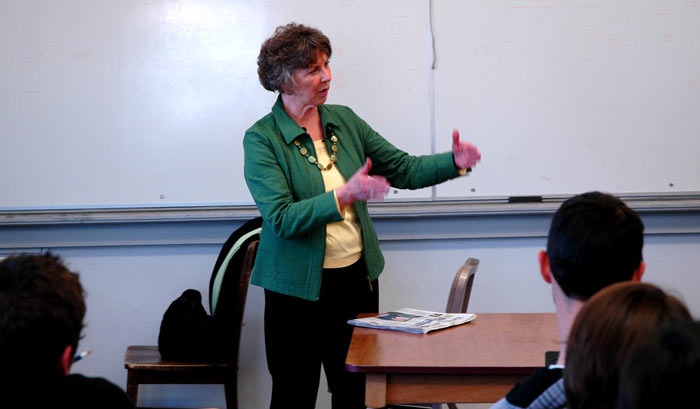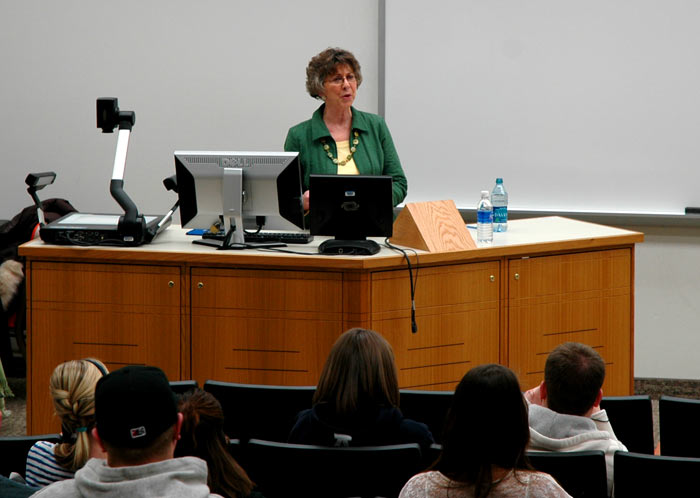SL Trib editor assures Utah State: ‘Dying newspaper’ is just a myth
March 30th, 2011 Posted in OpinionLOGAN—Journalism students everywhere have been taught that newspapers—the paper edition delivered to doorsteps across America—are dying.
In fact, “the dying newspaper” has become part of journalism curriculum, and students are being taught new survival skills in this so-called dying industry.
 For the editor of The Salt Lake Tribune, the death of newspapers is just that: so-called. Nancy Conway says it’s a myth.
For the editor of The Salt Lake Tribune, the death of newspapers is just that: so-called. Nancy Conway says it’s a myth.
“Traditional legacy newspapers like The Salt Lake Tribune are doing better than just holding their own,” Conway told 100 students and others Tuesday morning. “In the state of Utah, I would like to point out that we are still here, still in business. The Salt Lake Tribune, the Deseret News, the Logan Herald, the Spectrum in St. George, The Wasatch Wave in Heber, and the rest of all those weeklies and dailies across the state. As far as I know, none of us are going anywhere anytime soon.”
• Editorial: Looks to me like newspapers are dying.
Conway, since 2003 the editor of Utah’s largest daily newspaper, the nation’s 72nd largest, spoke on the Utah State University campus Tuesday as part of the Department of Journalism and Communication’s Morris Media & Society Lecture Series.
Conway said that people still want news they can trust brought to them by professional, reliable and credible news organizations. This is why it is only a myth that newspapers are disappearing.
“Newspapers through print and online editions are reaching more readers than ever before,” she said.
While all newspapers have seen print subscription drop-offs in recent years, Conway believes that this downward trend has slowed.
“According to Scarborough [Research], 71 percent—around 165 million people across the country—read a newspaper in print or online last week,” Conway said. She admits that the newspaper business is changing, but she believes change does not mean death.
“Sure enough, we are changing,” she said. “We have to because readers are migrating to the Web. But we are not folding up the print shop or going out of business as many have predicted.” She said that five years ago media watchers were prophesying the death of newspapers within the next five years.
 “Well they are obviously wrong. Dead wrong,” Conway said. “Here we are, The Salt Lake Tribune and most of our colleagues, doing what we have long done—Journalism with a capital J.”
“Well they are obviously wrong. Dead wrong,” Conway said. “Here we are, The Salt Lake Tribune and most of our colleagues, doing what we have long done—Journalism with a capital J.”
What she means by that is that journalism is about more than how information is spread and acquired. New technologies are changing news delivery systems, she acknowledged, but that just means that there are more ways to get reliable, credible information, which is what news businesses like the Tribune specialize in providing.
Conway said that the reason newspapers are able to stay alive is that they are learning new ways to increase their revenue. She said that MediaOne, the company that manages the joint business operations of both the Tribune and the Deseret News, is building diversified businesses, including printing and real estate, for this purpose.
“What my organization is doing is subsidizing their real estate business, they’re running a web design business, they’re running an advancement business, they sponsor the governor’s economic council,” Conway said. “They’re doing all those things plus they’re publishing a lot of weeklies and monthly magazines and other things to support the newsroom.”
She also said that adding new forms of media, such as online, are also important to keep newspapers running. Conway said that the Tribune has been able to do this by maintaining a healthy balance between old and new forms of media.
• See the Utah Statesman version of this story.
“We are keeping the core product, which is the print, strong, and we are improving and increasing our digital products,” she said. “Most importantly, the model we have developed allows us to expand to new platforms.”
 Conway said that the Tribune has a steady news readership for both online and print, and that certain stories draw the readers to the website.
Conway said that the Tribune has a steady news readership for both online and print, and that certain stories draw the readers to the website.
“We have a joke in the newsroom about how to get hits online, and of course it is sex, sex and sex,” Conway said. “And anything LDS, or Cougars, or BYU, or gay and lesbian, in any combination draws readers.”
While Conway notes the importance of the newspaper to the reader, she said that the newspapers are also vital because they serve as a watchdog.
“It is the role of the press to watch government, watch what they do, report what they do to the people in the state who need it to make informed decisions that affect their lives,” Conway said. “We are far from perfect, sometimes we don’t get the whole story, sometimes we don’t tell it in a balanced way, sometimes we don’t follow up the way we should, but however long the list of our inadequacies, it is better to have us than not to have us.”
Conway cited the recent controversy over House Bill 477, last-minute legislation passed by state lawmakers that gutted the state’s open-records law, the Government Records Access and Management Act (GRAMA). The two-week rise and fall of the new law, which was repealed in a special legislative session on Friday after widespread public outcry, was brought to the public’s attention because of the press. She said it was these informed readers who helped get the bill repealed.
“With all the news coverage, people understood very quickly what [HB]477 meant,” Conway said.
Conway said state legislators were inundated with public complaints about the bill.
“[The public] formed groups, they rushed the Capitol on the last day of the legislative meeting, they protested, they sent letters, they telephoned, they sent emails,” she said. “The passion and the anger of the citizens surprised the Legislature, but the people really got it. They understood that 477 would let the people who represent them keep their business secret. The government of the people would not have been done for the people.”
Conway said that this was the perfect example of democracy in action: journalists watched what was  happening and then reported it to the people. But the opposition to the weakened open-records law came not just from the press, but from grassroots citizen groups, she said.
happening and then reported it to the people. But the opposition to the weakened open-records law came not just from the press, but from grassroots citizen groups, she said.
“I think in Utah has a real strong libertarian bent,” she said. “People don’t want government wrecking and messing in their business. And I think part of that was the motivation for making this GRAMA act as open as well written as it is.”
For Conway, journalists are crucial to keeping the people informed about what their elected representatives are doing. She said that Thomas Jefferson did a good of describing the importance of newspapers when he said, “the press is the best instrument for enlightening the mind of man, and improving him as a rational, moral, and social being.”
Kristi Lambert, a sophomore who is majoring in PR and speech communications, agrees with Conway that newspapers aren’t dying.
“I agree to an extent,” she said. “While not as many people are reading print as they used to be, online readership is growing.” Lambert said she gets her news from different sources and was glad to learn more about the subject of the “dying” newspaper. She had written an article for her school newspaper about the issue, she said.
“I wrote a piece about how print journalism was going away,” she said, “so it was great to hear the other side of this.”
Chris Olsen, an undeclared freshmen, agrees, and felt Conway’s message was reassuring.
“I thought it was very interesting to get the take of a newspaper editor on the myth,” Olsen said. “She had a lot of facts, and they were kind of overwhelming, but the fact that the newspaper isn’t going anywhere was good to hear.”
Stephanie Zollinger, a junior journalism major, said she gets most of her news online, but she also uses other media when needed.
“I like listening to NPR mostly” she said. “I like to read the newspaper when it’s available.
“I have the Herald Journal, and I look up on the Internet the Salt Lake Tribune every once in a while. And the Statesman.”
She believes that there is power in a newspaper that is not present in other media.
“There’s something to a newspaper that you can’t get out of anything else,” Zollinger said.
Conway said that the press is very important to the community and that journalism is a good place for people who care.
“In this very great country that we all pledge allegiance to, if you care about community, if you care about country, if you care about democracy,” she said, “you have to care about journalism.”
Conway’s speech was the next-to-last event in this year’s Morris Media & Society Lecture Series. The final lecture will be by JCOM alumna and BYU law professor RonNell Andersen Jones, a former Supreme Court clerk who will discuss “The Blame Game: The People, The Press and the U.S. Supreme Court” on April 14.
TP
Tags: Morris Media & Society Lecture, Nancy Conway, new media, newspapers, Salt Lake Tribune

3 Responses to “SL Trib editor assures Utah State: ‘Dying newspaper’ is just a myth”
By Matthew D. LaPlante on Mar 30, 2011
Alas, I fear that the myth of “a myth” is being greatly exaggerated.
When I started at The Salt Lake Tribune in 2003, we had somewhere in the neighborhood of 120,000 print subscribers. Today, we have 80,000. That’s bad news, because print and classified advertising still accounts for the vast majority of newspaper revenue — about 90 percent nationally, according to the Newspaper Association of America.
Yes, online revenue is growing — the NAA was gushing a few months back about a 14-percent bump in fourth-quarter revenue over the previous year. The web now generate about $700 million per quarter in revenue for America’s newspapers.
But that’s a slightly bigger slice of a significantly smaller pie. Print and classified advertising account for about $23 billion in revenue — a precipitous fall from nearly $60 billion in revenue in the late 1990s, (before those pesky folks at Craigslist and Yahoo came along.) And sadly, as part of the overall picture, Internet revenue may be up from last year, but it’s not significantly greater today than it was in 2003-04.
To be certain, The Tribune is doing better than most papers. Last I heard, Utah’s most important news gathering organization had never had an unprofitable quarter. For the record, I also think that we are doing better work than most other papers (and certainly better than most others of our size). While I don’t always agree with her, I credit Nancy Conway’s leadership for our survival and success.
So I’ll give her the benefit of the doubt when she says that The Tribune will survive this turmoil. But the numbers simply don’t paint any sort of a picture of an industry as a whole that will survive — much less thrive. And this democracy — now more than ever — needs a thriving press.
By Nancy Conway on Mar 30, 2011
Matt, You are wrong about the numbers Matt. I don’t know where you got them. We are still circulation about 119,000 print copies according to our latest audited ABC report. Also, Matt, The Salt Lake Tribune’s online revenue has increased substantially since 2003. In the last two month alone over 40 percent.